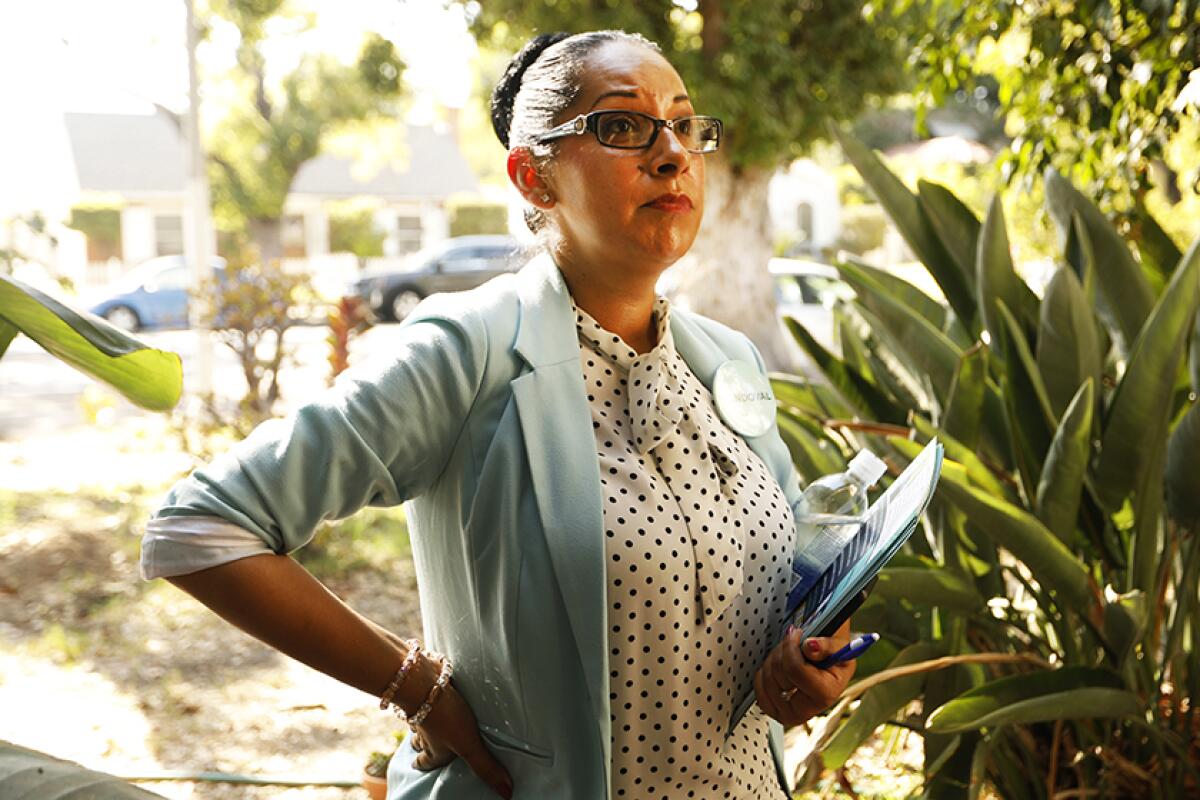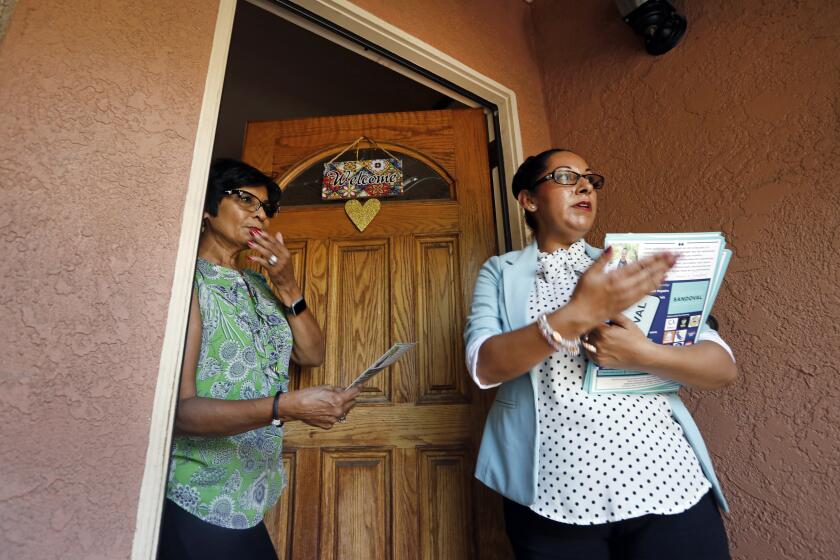Endorsement: The Times rescinds its endorsement of Danielle Sandoval for L.A. City Council

- Share via
On Sept. 22 the Los Angeles Times editorial board endorsed Harbor City businesswoman and community activist Danielle Sandoval for City Council District 15 in the Nov. 8 election over her opponent, arguing that she would bring an outsider perspective to city government.
The next day, The Times broke a news story about long-standing, unpaid wage theft judgments four former employees won against Sandoval’s defunct business, a San Pedro restaurant called Caliente Cantina that closed eight years ago.
A hearing officer, acting on behalf of the state’s labor commissioner, determined in 2015 that the business had failed to pay Jose Flores Esqueda, Isaac Garcia, Jose Higareda and Alejandro Jaramillo for work they had performed, and ordered it to pay them a total of $12,447. The company, also known as Cantina Investments LLC, now owes the employees $22,481, which includes the original judgments and years of accrued interest, according to the state Department of Industrial Relations.
Those revelations, and Sandoval’s shifting and unsatisfying responses in the weeks since, have raised serious questions about how she might perform the job of a city council member. The editorial board no longer recommends that voters support her to represent this district that includes Watts, the Harbor Gateway, Harbor City, Wilmington, San Pedro and the Port of Los Angeles.
We are now endorsing Sandoval’s opponent, attorney Tim McOsker, a former lobbyist and nonprofit executive from San Pedro.
Three political groups have rescinded their support of council candidate Danielle Sandoval, following a Times report on wage claims targeting her restaurant.
Rescinding an endorsement is not a decision we made lightly or in haste. In addition to re-interviewing Sandoval, the board reviewed documents filed in the wage cases, copies of text messages from 2014 and recent email correspondence between Sandoval’s attorney and the Wage Justice Center, which is working on behalf of the state’s labor commissioner to collect the workers’ claims. That review left us with concerns about Sandoval’s diligence as a business owner and her ability to lead a council office representing more than 250,000 people. And we found that despite her statements that she has taken responsibility, she has not offered to pay the workers what they are owed in full.
Wage theft is serious abuse, and many workers aren’t able to get paid even years after winning court judgments against their employers. Three of the workers identified Sandoval as the owner of the restaurant, according to filings in their wage cases, two of them furnished text messages in which she allegedly acknowledged they were owed money and another said he spoke with her directly. It’s an injustice that these workers, who made between $10 and $12 per hour cooking and washing dishes, were for years denied the wages they earned.
Sandoval’s initial response to the Sept. 23 report was dismissive and defiant, but her tone changed after prominent supporters began pulling their endorsements. On Sept. 30, Sandoval posted a statement saying “there is no excuse for this to have gone unpaid and unresolved for this length of time, for that, I offer my deepest apologies to those impacted.”
“I am taking full responsibility,” the statement said. “My team, lawyer, and supporters are working diligently to ensure that the workers get paid as soon as possible.”
When The Times editorial board re-interviewed Sandoval on Oct. 3, she denied knowing about any claims of unpaid wages until July 2022 and accused a worker who testified that he had spoken to her about it directly of lying. She downplayed her involvement with business operations and finances and shifted blame, saying she owned it in partnership with her husband, Quinn Padilla, from whom she is now separated, and relied on others to handle things like scheduling and payroll.
But Sandoval’s contention that she was unaware of the claims and judgments against her business until a few months ago seems implausible. A state Department of Industrial Relations spokeswoman said Sandoval was served numerous legal documents over the years at the address the business registered with the secretary of state, including demand letters, notices, liens and the judgments against it. Sandoval told us that she had no access to mail sent to the restaurant, or even her home mailbox, for some time and that she received none of that paperwork until last month.
The L.A. Times’ editorial board endorsements for statewide ballot measures, elected offices in Los Angeles city and county, L.A. Unified School District board, L.A. county superior court, statewide offices, the state Legislature and U.S. House and Senate seats.
Sandoval also denied having conversations with workers about unpaid wages, and suggested it could have been other staff members communicating on a shared cellphone that was used by multiple employees. But a 2014 text message exchange turned over by workers and reviewed by the editorial board asks a contact labeled “Danielle BOSS” repeatedly for weeks about paychecks owed, saying at one point “I really need to get paid I’m a month away from getting kicked out of my house I really need the $$$” and later, “Danielle it’s bin a month. I can’t wait no longer.”
Sandoval said on Oct. 3 that, through her attorney, she had offered the workers “full payment.” But neither she nor her attorney, Gregory Richardson, in a subsequent phone call, would provide documentation of her settlement offer or disclose the amount she had offered to pay the workers. Email correspondence the editorial board obtained from the Department of Industrial Relations, however, shows that Sandoval, through her attorney, on Sept. 30 offered to pay $9,000 to settle the four cases. That is less than the total $12,447 found due to the workers by a hearing officer in 2015 — and in no way constitutes a “full payment.”
The state rejected the offer and demanded payment of the $22,481 the workers are owed. On Friday, Sandoval’s attorney agreed to pay $5,052 total to settle with two of the four workers, Garcia and Jaramillo, who agreed to accept the original judgment amounts from 2015 and waive the interest and costs that have accrued since then, according to the Department of Industrial Relations. Negotiations over the two other cases were ongoing as of Monday.
Tim McOsker, Sandoval’s opponent, knows City Hall inside and out, having worked as chief of staff to former Mayor James Hahn and chief deputy city attorney. He has the support of many local politicians, business groups and labor unions, and his experience prepares him well for the work of managing a disjointed district with challenges as varied as poverty and homelessness and port and refinery pollution.
Electing McOsker would mean, once again, elevating someone from San Pedro, which has for decades had outsize influence over how district resources are allocated, despite accounting for less than one-third of the district’s population. To be an effective and responsive council member, McOsker will have to fight against this imbalance and for the people of Wilmington, Watts and other communities whose concerns have too often been ignored. Voters should give him a chance to do so.
More to Read
A cure for the common opinion
Get thought-provoking perspectives with our weekly newsletter.
You may occasionally receive promotional content from the Los Angeles Times.












